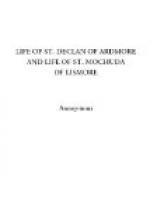16. After some time Declan set out to visit Aongus MacNatfrich, king of Cashel, to preach to him and to convert him to the faith of Christ. Declan however had two uterine brothers, sons of Aongus, scil.: Colman and Eoghan. The grace of the Holy Ghost inspiring him Colman went to Ailbe of Emly and received baptism and the religious habit at the latter’s hands, and he remained for a space sedulously studying science until he became a saintly and perfect man. Eochaid however remained as he was (at home)—expecting the kingdom of Munster on his father’s death, and he besought his father to show due honour to his brother Declan. The king did so and put no obstacle in the way of Declan’s preaching but was pleased with Declan’s religion and doctrine, although he neither believed nor accepted baptism himself. It is said that refusal (of baptism) was based on this ground: Declan was of the Decies and of Conn’s Half, while Aongus himself was of the Eoghanacht of Cashel of Munster—always hostile to the Desii. It was not therefore through ill will to the faith that he believed not, as is proved from this that, when the king heard of the coming to him of Patrick, the archbishop of Ireland, a man who was of British race against which the Irish cherished no hate, not only did he believe but he went from his own city of Cashel to meet him, professed Christianity and was immediately baptised.
17. After this Declan, having sown the word of God and preached to the king (although the latter did not assent to his doctrines), proceeded to his own country and they (the Desii) believed and received baptism except the king alone and the people of his household who were every day promising to believe and be baptised. It however came about through the Devil’s agency that they hesitated continually and procrastinated.
18. Other authorities declare that Declan went many times to Rome, but we have no written testimony from the ancient biographers that he went there more than three times. On one of these occasions Declan paid a visit to the holy bishop of the Britons whose name was David at the church which is called Killmuine [Menevia] where the bishop dwelt beside the shore of the sea which divides Ireland from Britain. The bishop received Declan with honour and he remained there forty days, in affection and joy, and they sang Mass each day and they entered into a bond of charity which continued between themselves and their successors for ever afterwards. On the expiration of the forty days Declan took leave of David giving him a kiss in token of peace and set out himself and his followers to the shore of the sea to take ship for Ireland.




